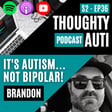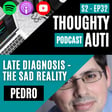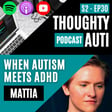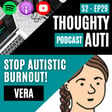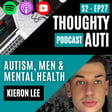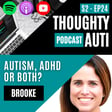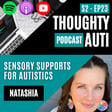
The Hidden Link Between Autism and Addiction
Why are Autistic people more prone to addiction? What is the difference between substance addiction and process addiction? How can you recover from addiction?
Patrick Casale (@allthingsprivatepractice) is a licensed clinical mental health counselor and addiction specialist in Asheville North Carolina (USA), diagnosed Autistic at the age of 35 years old. Patrick runs group psychotherapy sessions and retreats for LGBTQIA+ and Autism individuals but also coaches mental health practitioners on how to grow their businesses.
My Links - https://linktr.ee/thomashenleyUK // Patrick's Links - https://beacons.ai/allthingsprivatepractice
Dbud Noise Cancelling Adjustable Ear Buds (20% OFF with code: THOUGHTYAUTI) - https://dbud.io/thoughtyautipodcast
Thomas start's the conversation fanboying about the recent Divergent Conversations podcast episode they recorded with Dr. Megan Neff from @neurodivergent_insights where they talked about Thomas' favourite topic... Autistic alexithymia!
Patrick soon goes into the basics behind understanding addiction through a bio-psycho-social lens, highlighting that addiction is caused by a loop of obsessions and compulsions. He provides some clarity by distinguishing between the mechanisms behind process addiction VS substance addiction, and addiction VS dependency.
Thomas speaks on his experience with nicotine addiction and alcoholism which took place during his university years, as well as his rabbit hole of research into the recreational substances that were taken by those around his dormitory. Nicotine and caffeine are perhaps some of the most readily available and addictive substances, being particularly enjoyable at first before becoming an expensive and boring habit.
Many people who become addicted often have a naive illusion of control, hiding their dependency from others due to feelings of shame and making deals with themselves that will soon be broken during the height of addiction. Thomas highlights that motivation is often idolised, but tends to be inherently fleeting in nature... humans are, after all, creatures of habit!
Patrick opens up to Thomas about the destructive nature of his gambling addiction, illuminating that the process or lead-up before placing the bet was the most addictive part for him. The level of shame and depression he felt leaving the casino early in the morning is a common feeling for most addicts and leads to a high rate of suicidality.
Lies, financial destruction, personality changes, impulsive action, desperation, and extreme lows... are all the parts of addiction that ravage the lives of addicts and those around them.
Thomas and Patrick contemplate and discuss the reasons why Autistic people may be more prone to addiction in any form. Some use it as a form of reliable regulation, some seek those good feelings to replace their need for connection, and others lack self-care due to the overlap between <







